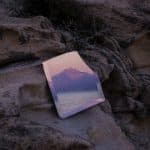Muse of the million,
I am made Helen again,
devourable and sexless entire
surely she (know-nothing of desire)
couldn’t comprehend the carnal filigree
in the eyes of Paris after Paris
Helen after Helen, I’ve been through
incarnations of her face many
times too many, the masquerade
ages explosively, corks pop
from the lips of celebration bottles.
Broken sabres by which, finally,
Helen is etched in an edifice
one more hard myth memorialized.
And her successor is Shaharazad
that ruthless expert, virgin
to every experience
adept of a thousand and one ages
ageless night after mortal night,
besting king and father, and farther
than that—outliving even herself
so her life survives still suspended in the margins,
a frame for the stories she told at the knife’s edge.
Rasha Abdulhadi is a queer Palestinian Southerner disabled by Long Covid. Rasha’s writing has appeared in Kweli, Poem-a-Day, Anathema, Shade Journal, FIYAH, Mizna, and Strange Horizons and is anthologized in Essential Voices: A COVID-19 Anthology (forthcoming), Snaring New Suns, Unfettered Hexes, Halal if You Hear Me, and Luminescent Threads: Connections to Octavia Butler. A poet, fiber artist, speculative fiction writer, and editor, Rasha is a member of Muslims for Just Futures, the Radius of Arab American Writers, and Alternate ROOTS. Their new chapbook is who is owed springtime.
Photo by Graham Holtshausen on Unsplash
Creator Spotlight:
Rasha Abdulhadi
Author of “Helen After Helen”
What inspired you to write this poem?
I wrote this when I was 19 and never expected anyone else to read it, much less publish it. In that other era of life, I was a performer and played both of these roles in different productions. I felt aware of the contrast between the two, one woman treated as a prized object and inciting event, the other full of agency and always in danger, neither of them centered in the stories in which they are, in fact, central and in which they are made immortal. I was also acutely aware of the complex reactions of desire, resentment, and ownership that various collaborators and audiences felt toward me, even though they didn’t know me at all and had just watched a performance.
What do you hope readers take from this poem?
Whatever they need! Perhaps more than I can know or knew was in this combination of images.
To give other writers hope, would you mind sharing with us how many edits and/or submissions this poem has been through?
Improbably, and in contrast to other poems I’ve reworked over many years and sent out more than 30 times, this is the first time this poem has ever been sent to a publication. Even my longtime writing partner has never read it! This is one of the rare small poems that comes out all in one go and survives minor edits of line breaks, word changes, or punctuation mostly unchanged.
Recommend something to us! This could be a book, a short story, a video game, a project you’ve heard about, something you’re working on, etc. Anything that has you excited and that you want people to know about.
The Black SWANA Takeover issue of Mizna that just released is a must-read. I also invite folks to read younger Palestinian writers. Strange Horizons, FIYAH, Mizna, and Sumou magazines all have recent or forthcoming special issues and regular features.






